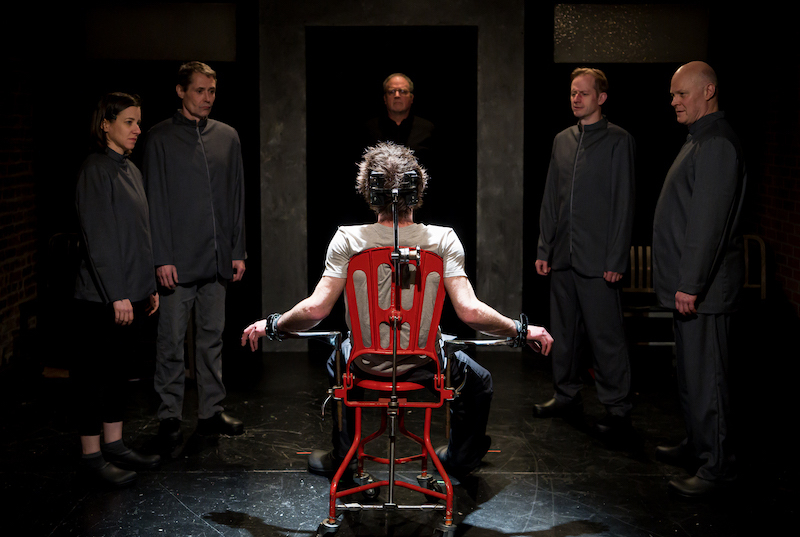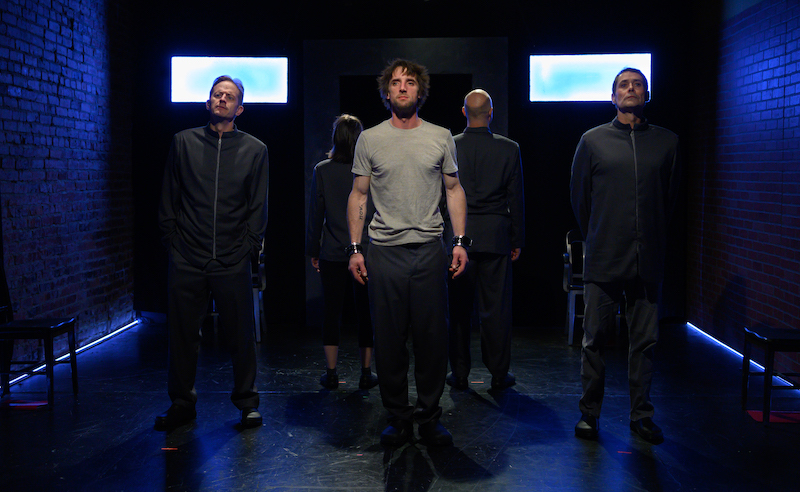1984: Another Big Brother
Review of 1984 at 18th & Union Review.
Written by Teen Editor Josh Fernandes and edited by Press Corps Teaching Artist Omar Willey.

1984 is the kind of book I definitely should’ve read, but I think one of the play’s strengths is how seamlessly the material is adapted for the stage. After reading Brave New World and The Handmaid’s Tale, I sort of dismissed 1984. Both of those dystopias have a unique form of control over their citizens: Brave New World controls through pleasure in order to eliminate conflict and for the prosperity of its citizens, and The Handmaid’s Tale controls through language in order to save the declining birth rates of the white race. 1984 controls through fear simply for the sake of the Inner Party’s personal whims, which I always assumed to be sort of basic. Sure, 1984’s influence can be felt in all kinds of media, but I never thought to read the original. However, 18th & Union's adaptation certainly proves the merit of the original work, and I have no shame in saying that this is how I first experienced it.
The play is set in a dystopian future and follows Winston Smith, a “records editor” who seeks to escape and rebel against the ever looming and controlling presence of Big Brother alongside his new love Julia. The play doesn’t start here however, rather the entire show is set in an interrogation room set after Winston has already been captured. The audience is shown his story through a reenactment put on by party members based on the writings they find in Winston’s diary.

The general setting is actually quite reminiscent of a play I saw last year: We Will Not be Silent at Taproot Theatre. Both are based on books, take place in a single interrogation room, and follow a protagonist rebelling against a fascist regime. The key difference is how personal the story is in We Will Not be Silent, with the relationship between White Rose protest member Sofie and her Nazi interrogator being the central emotional core. In 1984 however everything feels so impersonal. The way Winston’s story slowly becomes more distant gives the impression of someone finding out they’re merely a pawn, and that this is merely one story out of a thousand happening at the same time.
It stays faithful to its written roots by having most of the scenery be purely spoken, with minimal set design. This lack of set design never feels like an absence however, rather a deliberate choice designed to allow the viewer to imagine the environments right alongside the characters. This is of course carried by excellent acting from everyone involved. I was honestly shocked by how much the supporting cast gets to shine. Everyone gets a turn in the spotlight, with highly emotional performances reenacting Winston’s journal contrasting brilliantly with the cold detachment of the party members. The range of the actors is really highlighted here, not to mention the excellent performance given by Ryan Higgins as Winston. Watching him shift in and out of lucidity is haunting; there’s a real pain he brings to his performance.

This play within a play setup is ingenious, and really fits one of the story’s main questions: “What is reality?”
1984 has a lot of these questions, “What is history?” “What is language?” and “What is love?” to name a few. The play’s answer is possibly its most powerful, uncomfortable, and frustrating statement: “It depends on your perspective.” Being a play, the audience’s perspective is narrowed to merely a single, unchanging room. The audience gets out of their seats and leaves the theater, but they can never escape that room.
1984 was presented at 18th & Union February 21 - March 11. For event information see here.
Lead photo caption: Marianna de Fazio, K. Brian Neel, Ryan Higgins and Lyam White in 1984 at 18th & Union. Photo by Marcia Davis.
This review was written as part of mentorship program where members of the Teen Editorial Staff receive one-on-one mentorship by Press Corps Teaching Artists and professional critics. The Teen Editorial Staff is made up of 6 teens who lead the TeenTix Newsroom and curate the review portion of the TeenTix blog. More information about the Teen Editorial Staff can be found HERE.
The TeenTix Press Corps promotes critical thinking, communication, and information literacy through criticism and journalism practice for teens. For more information about the Press Corps program see HERE.

